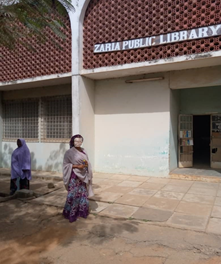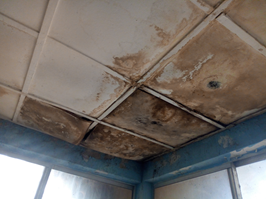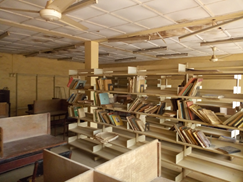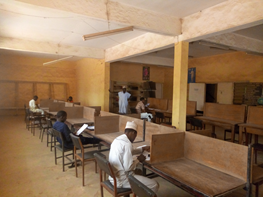Mobilisation Fee Stalls Renovation Of 40-Year-Old Zaria Public Library
The public library in Zaria, Kaduna state, Northwest Nigeria, despite appropriation for its renovation has remained in a sorry state.

With a leaking roof, outdated books, collapsed toilet and overgrown entrance, there are many more signs all over the place showing that the only public library in Zaria town, Kaduna State, Northwest Nigeria is a shadow of its old self.
As the fourth largest and third most populous state in Nigeria, Kaduna State is nicknamed the Center of Learning. Zaria is home to 13 tertiary institutions, popular among them being: Ahmadu Bello University Zaria, the National Institute of Transport Technology, the Nigerian College of Aviation Technology, and Nuhu Bamalli Polytechnic. Despite a continuously growing need by the reading public, the Zaria Public Library, a 40-year-old library is moribund and needs urgent attention.
The Library was established in 1981— to cater to the needs of the reading public. The Library has three sections; the children’s section with age appropriate books, the reference section for research and information gathering, and the adult section which is subdivided into sciences and social sciences. Today, out-of-date books, and the failing structures of the building are the most visible evidence that no meaningful reading, studying, or research can take place at the library.
Sadiya Ahmed, the Chief Librarian laments the absence of important renovations required for the library to function properly. An unrepaired leaking roof has resulted in damages to tables, chairs, shelves, and other supporting facilities. Sadiya says there is no electricity and running water, and that the toilet has also collapsed.

“Oftentimes, some readers come with their own mats that they lay on the ground for their own convenience,” she said. “This used to be a library that was once a home to hundreds of thousands of books.”
Aliyu Jibril, the Assistant Librarian is distraught about the current condition of the library. “The library structure used to be colourful and neat. However, today, the entrance is covered with weeds and very unkempt,” Jibril told a team of independent procurement monitors who visited the library.
He recalled how books at the library were new and always updated. “Children visited every day to read from the earlier collections which ranged from sciences to arts, with stories and artworks that could attract and prick the wildest imaginations of children, all the while teaching them basic vocabulary, grammar, and fundamental mathematics.”
The monitors were on the trail of the rehabilitation contract for the library awarded by the Kaduna State Government in 2017.
“This place used to be a safe haven for people who liked to read,” Jibril laments. “We had a lot of books before now and people trooped in and out to just get lost in the pages of some books, but now the place is dead. No light, no water, we don’t even have a functioning toilet.”
A botched renovation contract
The public library was meant to receive a facelift when Kaduna State Government in 2017 awarded the contract for its renovation at the sum of N90,190,088.25 to Universal Engineering Pillars Ltd to handle. The state government had budgeted N25 million for the project that was supposed to last six months.
But while the status of the project on the website of Kaduna State procurement agency was showing ‘completed’, in reality, the library was never touched by the contractor.
A disagreement over mobilisation fee between the contractor and the supervisory ministry, Kaduna State Library Board has since 2017 stalled the rehabilitation work and the library is worse for it.
“There was nothing done in the library with respect to the project so far. The library has been in the same situation as it is and no contractor has reported to the location or the Ministry reaching out to them,” Mohammed Dahiru Jamila, a member of the procurement monitors team said.
While the contractor insisted on being paid a 50 per cent mobilisation fee, the Kaduna State Library Board was ready to pay just 30 per cent. “That’s the kernel of the disagreement and the real reason the library has continued in its sorry state,” says Mohammed Sani Kassim who leads the monitoring team.
“We paid an advocacy visit to the implementation agency, which is the Kaduna State Library Board,” Kassim said.
“We found out that the project was indeed awarded in 2017 but it took the implementation agency and the contractor a lot of time to finalize the negotiation on the percentage of mobilisation funds. The contractor insisted on fifty percent of the contract fee while the government insisted on only thirty percent.”
The Kaduna state procurement law says contracts are awarded based on the capacity of contractors to mobilise to the sites to work while the funds are released at a certain stage. The contractor held the government to ransom on the project. However, the procurement monitoring recommended that the state government revoke and re-award the contract to a contractor that has the financial capacity to undertake the project.
Government revokes the contract
Kassim says that the team succeeded in making Kaduna State Government revoke the contract after about three years of passivity.
The team, he said, drew the attention of the Kaduna State Public Procurement Agency to change the status of the project on the portal from ‘completed’ to ‘not started’. The State government and the State Library Board were also notified to ensure that this project is revoked, re-awarded and duly followed for implementation.
“What we were able to achieve during that time was to get the government to revoke the contract,” he reveals.
“The contract was revoked. Earlier this year, we also engaged them in re-awarding the contract because revocation was actually not what we wanted. We want the library to work. If the contract is revoked, it means the service delivery is not there. We engaged them to get the contract to be re-awarded to another contractor, but that has not happened.”
Pains and losses
The current non-functional state of the library is decreasing the comfortability of reading, which in the long run will reduce learning outcomes, says Kassim who notes that many more readers are getting discouraged from using the library. When completed, the Zaria Public Library is expected to be upgraded to more modern standards.
“We did three visits to the library and during one of the visits, we saw some people reading and asked them what were their challenges in using the library,” he recalls.
“Some of them were telling us about the leaking roof, outdated books, outdated facilities and even there was no internet service in the library which the renovation was supposed to take care of.”
Open contracting as a tool for development
Although existing for over 40 years the state of the Zaria Public Library has been in neglect. But the availability of open contracting platforms have begun to shed light into an array of abandoned projects like this across Nigeria.
Team members trained by the Public-Private Development Center on Open contracting portals have been instrumental in the discovery, tracking, following up and other activities that brought to light the neglected state of the library.
“With the data derived from the website, though there was false information showing the completed status of the project, citizens like us were able to question, investigate, recommend and put pressure on the implementing agency to change the status of the project,” Jamila says.
Open Contracting would also help fight corruption and looting of public funds by public officials as there is access to information. If the Kaduna state government still holds its commitment to raise the standard of education and maintain the status quo as a citadel of learning, rehabilitation of reading areas such as the public libraries should be one of its utmost priorities.
Support Our Journalism
There are millions of ordinary people affected by conflict in Africa whose stories are missing in the mainstream media. HumAngle is determined to tell those challenging and under-reported stories, hoping that the people impacted by these conflicts will find the safety and security they deserve.
To ensure that we continue to provide public service coverage, we have a small favour to ask you. We want you to be part of our journalistic endeavour by contributing a token to us.
Your donation will further promote a robust, free, and independent media.
Donate HereStay Closer To The Stories That Matter






